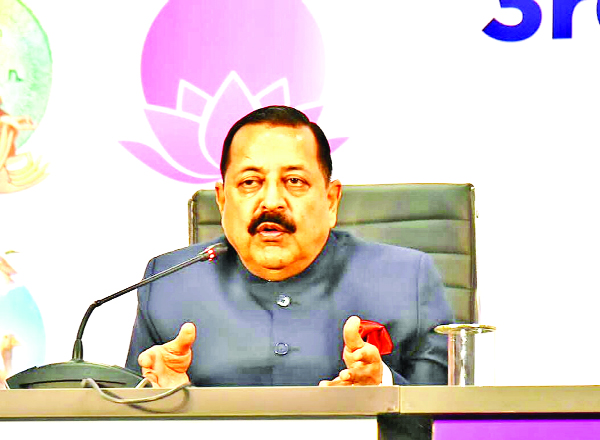DOGRA HERALD BUREAU
New Delhi, Dec 20
“Green Sustainability” is no longer a distant ideal or an optional endeavor-it has become a necessity, a singular path forward in the face of global challenges, emphasized the Union Minister of State (Independent Charge) for Science and Technology, Minister of State (Independent Charge) for Earth Sciences, MoS PMO, Department of Atomic Energy, Department of Space, Personnel, Public Grievances and Pensions, Dr. Jitendra Singh.
The pressing realities of climate change, resource depletion, and environmental degradation demand immediate, actionable commitment. Governments, industries, and individuals alike must pivot towards sustainable practices, embracing innovation and responsibility to ensure a livable planet for future generations, said the Minister. This shift is not merely a choice but an imperative for survival and progress in an interconnected world, he added.
Dr Jitendra Singh wasaddressing the Green Sarathi Summit organised by the Indian Express group.
Dr. Jitendra Singh highlighted that public participation has the power to influence policy direction, citing the collective response during the COVID-19 pandemic as an example. He pointed out that when citizens take ownership of sustainability efforts, it creates pressure for systemic change, making policies more inclusive and effective. He urged all stakeholders-government, civil society, academia, and industry-to collaborate in fostering solutions that are not only innovative but also widely accepted by communities.
The Minister, who is a medical doctor and diabetologist, brought a unique perspective by linking sustainability to public health. He pointed out the alarming rise of health issues like diabetes due to environmental degradation. Explaining the connection, he said the destruction of carbon-absorbing ecosystems, increasing pollution levels, and the prevalence of endocrine-disrupting chemicals, such as pesticides, are adversely impacting insulin production and its action in the human body. He stressed the importance of preserving biodiversity and reducing pollution, not just as an environmental imperative but also as a health necessity for India’s growing population.
Dr. Jitendra Singh elaborated on the government’s initiatives to combat climate change and promote sustainable practices. He highlighted the “Mission LiFE” initiative, which encourages individuals to adopt environmentally conscious lifestyles. He also discussed the Green Credits Program, which incentivizes eco-friendly actions by rewarding efforts that contribute to sustainability. National missions on climate change and strategic knowledge for climate resilience were also presented as key components of the government’s comprehensive framework to address environmental challenges.
The Minister spoke at length about the role of technology in managing climate change. He stressed the importance of digital public infrastructure, such as sector-specific solutions like a Climate Stack, which can provide accurate and real-time data for climate management. Additionally, he emphasized the necessity of accurate weather forecasting systems, particularly in the context of India’s vulnerability to extreme climate events, such as cyclones and urban flooding. These tools, he said, are crucial for disaster preparedness and resilience.
Dr. Jitendra Singh also drew attention to the pioneering work being undertaken by the Ministry of Science and Technology and the Ministry of Earth Sciences. He praised efforts to integrate science and technology into sustainability debates, such as developing early warning systems and sensor-based alerts to mitigate disaster risks. At the recent COP29 summit in Baku, India demonstrated its commitment to integrating disaster-resilient infrastructure into adaptation strategies, setting an example for global climate leadership.
In his concluding remarks, Dr. Jitendra Singh outlined the immediate and medium-term priorities for the government in achieving sustainability goals. He emphasized the need to foster adaptation and resilience, advance scientific research, and build robust partnerships with private sector stakeholders. He urged the industry to step forward with innovative ideas and investments to complement government initiatives, stating, “Sustainability is not a goal that can be achieved in isolation. It requires the collective efforts of every sector, every individual, and every institution.”
The Summit brought together policymakers, industry leaders, academicians, and environmental advocates for an in-depth discussion on sustainability as a cornerstone of India’s development strategy. Dr. Jitendra Singh’s address reflected the government’s commitment to fostering a sustainable future through public participation, scientific innovation, and a collaborative approach.



























